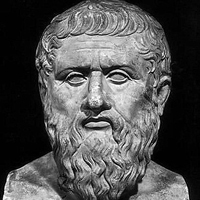Plato - Biography and Works
Plato (427-347B.C.), an Athenian of the ancient Greece, is the first major figure in the history of Western philosophy who is believed to be one of the most creative and influential thinkers in Western intellectual tradition.

Plato (427-347 BC)
His political and moral philosophy dominates a long chain of thinkers, writers and critics. He places reality in what he calls ideas or forms rather than in the world of the “appearances” that we experience through our senses. He regards objects we perceive through the senses as merely the copies of ideas. Plato, thus, is a dualist believing in two realities: one sensory and the other ideal. For Plato rational power can only acquaint us with the ideas and truth. The poets for Plato should be restricted to imitate the realm of appearances, since they make only the copies of copies and their creation is thus twice removed from reality.
His famous books like The Republic, Symposium etc. earned him a high reputation. In these books, he expressed his views on politics and the world, which he held to be inferior to the spiritual realm. Since Plato’s ideas have been the source and basis of almost all the modern philosophical discourse, it is important to notice what this great figure of ancient Greece held. Later, his thoughts were refined and have now been termed as Neo-Platonism.
Plato gives value to the spirit. He admits that, by giving value to the spirit, one can free oneself from the tyranny of sensory perception and sensory reward. Next, he argues that the body is a metaphor for spiritual delights. It is also very controversial because people of this present world consider the body as a metaphor for sensual and sensuous pleasures. The body is a means of spiritual fulfillment and appreciation for true beauty.
Plato Study Center
 |
bachelorandmaster.com |